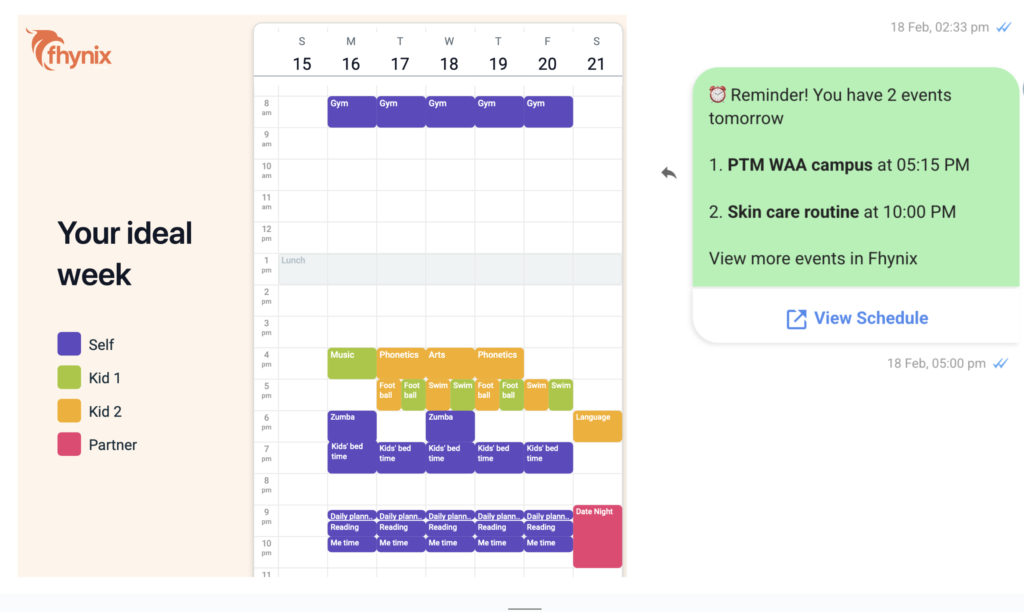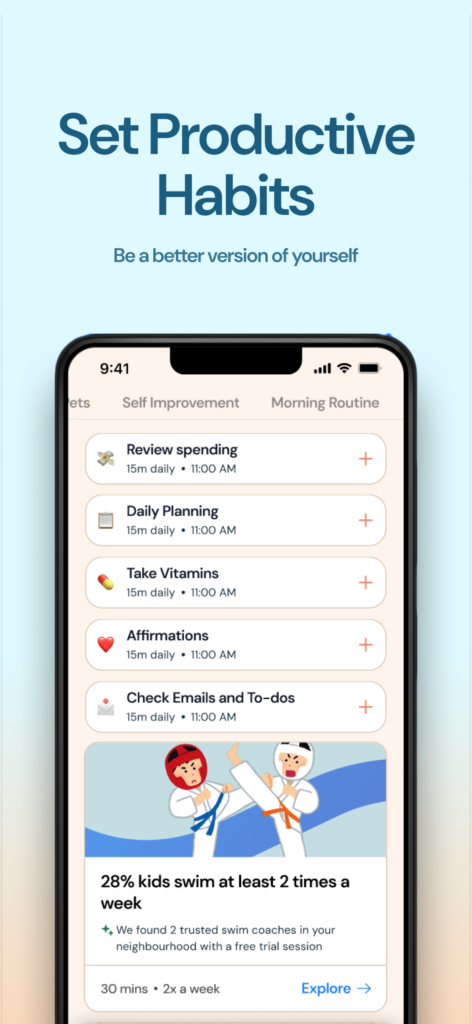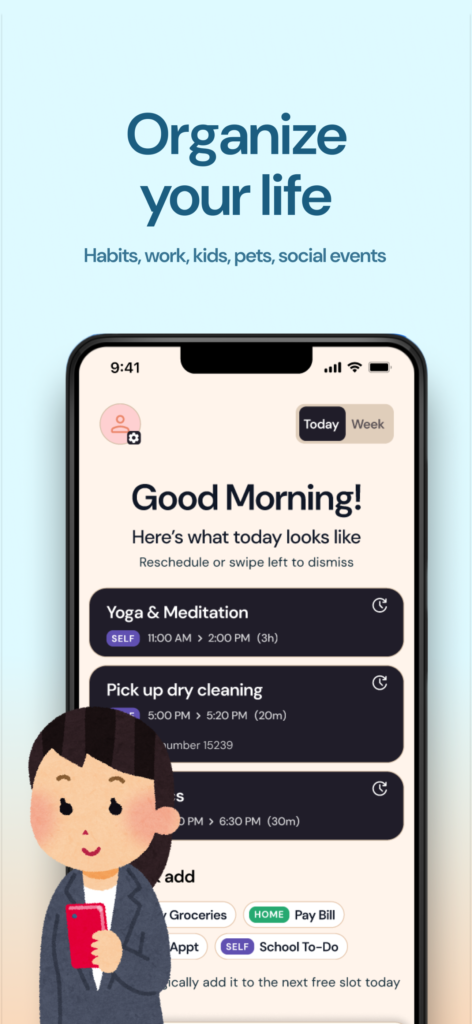What’s the Difference Between Daily and Weekly Planners?
A planner’s layout defines how you experience time. A daily planner focuses on what’s right in front of you, your immediate schedule, priorities, and tasks. A weekly planner, on the other hand, helps you step back and see how your entire week fits together.
The Fhynix calendar gives users the freedom to view their schedule in both ways. Since Fhynix merges your tasks and habits directly into your calendar timeline, switching between daily and weekly views doesn’t mean changing tools, it’s simply changing perspective.
In the daily layout, every hour is visible. You can drag and drop your habits, routines, and events exactly where they belong. It’s perfect for users with tight schedules or multiple appointments, such as professionals balancing meetings, workouts, and personal commitments. Seeing the day hour-by-hour helps you stay present and disciplined.
In the weekly layout, you see your whole week spread across one screen. It’s ideal for planners who like to visualize the bigger picture, students planning study goals, parents managing family activities, or entrepreneurs mapping weekly targets. This broader view helps prevent overloading certain days while underusing others.
Because Fhynix integrates both To-Dos and routines within the calendar timeline, you can easily transition between these modes. Whether you’re zooming in to plan a busy Tuesday or zooming out to map your week, all your data stays in one synchronized place. There’s no need for separate lists or extra apps.
Productivity and focus also differ between the two approaches.

A daily planner increases short-term focus. It helps you plan your time precisely, making sure nothing slips through the cracks.
A weekly planner improves long-term balance. It helps you avoid burnout by distributing commitments more evenly.
In Fhynix, you can use reminders for daily focus while keeping a weekly perspective for strategic goals, combining structure with flexibility.
If you’re still unsure which layout fits your lifestyle, check out our guide on how to plan your day effectively for step-by-step strategies. And for students or multitaskers, our curated list of time management apps for students highlights tools that make balancing academics and personal life effortless.
Take the Planner Quiz: Find Out Which Fits You Best
Everyone plans differently. Your perfect planner depends on how you think, work, and live. Use the quiz below to discover whether a daily or weekly system fits your personality.
1. What’s your schedule like?

Do your days feel packed from morning till night, or do you have space to move things around?
If your calendar is filled with meetings, calls, and precise time blocks, a daily planner structure will help you manage every slot efficiently. The Fhynix timeline view lets you assign events down to the hour, color-coded by category , whether it’s work, health, or family.
If your schedule is more flexible , with fewer fixed times but longer-term goals , a weekly planner view will give you clarity. It lets you see your priorities across several days, so you can decide when to focus deeply and when to rest.
In Fhynix, you can easily switch between these two views depending on how your week evolves.
2. What do you need the most help with?

If you struggle with prioritization , deciding what to do first , a daily planner helps you rank tasks by importance and place them on your calendar timeline. Fhynix makes this seamless by letting you visually allocate each task to a time slot, ensuring you don’t double-book or forget.
If your challenge is motivation , staying inspired and consistent , you’ll benefit from weekly planning. Fhynix’s integrated habit-tracking approach lets you visualize how your recurring actions (like workouts or learning sessions) build momentum over the week. Seeing progress accumulate in your timeline can be motivating.
If your main concern is long-term vision , connecting daily routines with life goals , weekly planning helps you see how smaller efforts align with broader ambitions. Fhynix helps you visualize both: your immediate tasks and how they ladder up to your overall lifestyle rhythm.
3. What’s your planning style?
Some people love structured lists; others prefer broad overviews.
If you thrive on structure, you likely prefer the daily planner style. You’ll enjoy setting reminders, assigning tasks to specific hours, and checking them off one by one. Fhynix supports this style through its intuitive timeline, where every task and routine is visible in sequence , turning planning into a satisfying flow.
If you prefer to plan in themes , for example, “Monday for creative work,” “Tuesday for meetings,” or “Friday for strategy” , you’re more of a weekly planner. In Fhynix, your calendar allows you to batch similar tasks together, making it easy to maintain focus on a single type of work across blocks of time.
4. How do you prefer to take notes?
If you enjoy detailed journaling, tracking emotions, and reflecting on each day’s progress, a daily planning format gives you the space to record these details. Fhynix’s notes integration allows you to attach written thoughts to each event, keeping everything organized within your timeline.
If you prefer concise summaries or brief checklists , something that tells you “what’s next” without too much writing , the weekly format suits you better. You can jot down quick updates at the end of each week to see overall progress without cluttering your calendar.
In both cases, Fhynix gives you an organized workspace where your notes and actions coexist in the same ecosystem , no switching between multiple tools.
5. Which statement fits you better?
“I plan my day hour by hour.”
If this sounds like you, you’ll thrive with the daily planning system. Fhynix’s detailed timeline layout gives you full control of your day. You can block time for meetings, workouts, errands, and breaks, ensuring balance and accountability. Every event is visually distinct, making it easy to stay on track without feeling overwhelmed.
“I plan my week goal by goal.”
If that’s your mindset, you’re more of a weekly planner. You focus on outcomes, not just activities. With Fhynix, you can schedule repeating habits , like exercise, study, or social time , across your week, tracking consistency while staying flexible about timing.
Now, Find Out Your Match
Mostly A’s → Daily Planner
You’re detail-oriented, methodical, and love structure. You enjoy knowing exactly what’s happening next and feel satisfaction in crossing off completed tasks. A daily planner helps you stay productive and eliminates decision fatigue.
Fhynix’s daily layout makes this effortless , your to-dos, routines, and events live in one continuous timeline, reminding you what’s next while helping you stay balanced.
Your ideal use of Fhynix: plan every hour with intention, use WhatsApp reminders for important calendar events, and review your daily progress each night. You’ll feel in control and motivated as you see your plans come to life hour by hour.
Mostly B’s → Weekly Planner
You’re strategic and prefer seeing the big picture. You think in patterns, not minutes. A weekly planner helps you stay aligned with broader goals without getting lost in small details.
Fhynix’s weekly view lets you see your entire week at a glance , helping you manage time distribution, avoid overload, and maintain balance.
Your ideal use of Fhynix: set weekly themes (like “learning,” “health,” “projects”), block habits across the week, and track consistency through the integrated calendar. This keeps your routines steady and your priorities visible.
Benefits of a Weekly Planner
1. Weekly Planning is Proactive, Daily Planning is Reactive
When you can see your entire week in one view, planning becomes proactive instead of reactive. You’re not scrambling to manage your day hour by hour , you’re anticipating what’s ahead. A weekly planner helps you align tasks, goals, and commitments before they pile up.
In Fhynix, the weekly calendar layout allows you to visualize how each day connects to the next. You can immediately identify busy stretches, lighter periods, and potential scheduling conflicts. By reviewing your week in advance, you can prepare for challenges like overlapping meetings, back-to-back events, or travel.
This proactive structure helps you stay calm and confident, knowing you’ve already balanced your time before the week begins. Fhynix’s unified calendar makes it simple , your habits, tasks, and events all appear together, helping you stay ahead rather than catching up.
2. Weekly Planning Prevents Over-Scheduling
One of the biggest benefits of a weekly planner is that it protects you from burnout. When planning only by the day, it’s easy to fill every available slot. But seeing your entire week at once helps you recognize when you’re overloading yourself.
In Fhynix, weekly planning gives you that perspective. You can spot patterns of imbalance , for example, three days overloaded with work and none reserved for rest or personal growth. With that insight, you can move tasks around using the simple drag-and-drop timeline, ensuring your week stays realistic.
Weekly planning also improves time-blocking. Instead of reacting to tasks as they appear, you intentionally assign space for different categories of life , work, self-care, health, and family. Fhynix supports this balanced structure by letting you visually separate and color-code events. When your calendar reflects all areas of life, it’s easier to maintain equilibrium.
A well-planned week also gives you room to breathe. You can plan downtime without guilt, knowing it fits naturally into your schedule. This balance isn’t accidental , it’s designed, and Fhynix helps make that design effortless.
3. Weekly Planning Creates Space for Larger Projects
Weekly planning is ideal for anyone who manages projects that extend beyond a single day. Whether you’re a teacher designing lesson plans, a creative working on campaigns, or an entrepreneur leading multiple initiatives, the weekly layout lets you visualize progress in stages.
In Fhynix, you can assign key milestones to specific days and distribute related tasks throughout the week. The calendar timeline keeps everything visible, so you don’t lose track of long-term objectives while focusing on daily work.
Seeing the big picture fosters strategic thinking. You can plan project phases, anticipate deadlines, and balance intensive work periods with lighter ones. The weekly structure also helps ensure that priorities aren’t buried beneath day-to-day noise.
For creatives, it means more room to plan brainstorming sessions, design sprints, or content development cycles. For professionals, it supports long-term project pacing. For educators, it ensures that lessons and evaluations are spaced logically.
In short, a weekly planner encourages foresight , and Fhynix brings that foresight into a clear, interactive timeline you can adjust as your week evolves.
Choose a Weekly Planner If:
- You manage multiple roles or projects that require strategic time distribution.
- You prefer seeing your week at a glance instead of focusing on every hour.
- You thrive when you can make flexible adjustments rather than rigidly following a detailed schedule.
- You like to plan themes for days , such as creative work on Mondays, meetings on Tuesdays, and learning on Fridays.
- You want to maintain long-term vision while still keeping your commitments structured.
With Fhynix, weekly planners gain the best of both worlds , high-level visibility and seamless execution. Every change in your weekly view instantly updates your daily view, keeping everything in perfect sync.
Ideal For:
- Busy professionals with packed schedules.
If your day involves multiple appointments, client meetings, or deadlines, Fhynix’s daily planner helps you manage time precisely. It transforms long lists into actionable timelines, ensuring that each task gets the attention it deserves. - Students balancing multiple classes or assignments.
A daily view allows students to plan study sessions, deadlines, and revision time hour by hour. With Fhynix, recurring academic tasks , like lectures or project deadlines , can be added once and tracked automatically, keeping your study week balanced. - People tracking habits, meals, or workouts.
Daily planning helps maintain discipline in health and wellness. You can schedule meal times, workouts, and relaxation breaks within your timeline. Fhynix’s unified view means these healthy routines coexist with your professional tasks, creating genuine balance.
For anyone who values precision and productivity, daily planning builds consistency one day at a time.
Which Self-Care Planner is Right for You?
Planning isn’t only about productivity — it’s also about wellness. A self-care planner helps you create intentional space for rest, gratitude, and reflection. The way you plan self-care depends on your personal rhythm, and both daily and weekly formats serve different wellness needs.
If your focus is on mindfulness and reflection, the daily planner layout gives you more room for journaling and gratitude tracking. Fhynix lets you attach personal notes to each event, so you can record reflections, moods, or thoughts after completing a task. Over time, these notes build a meaningful record of progress and emotional well-being.
If your focus is on long-term wellness goals — like developing consistent sleep routines, exercise habits, or social connections — the weekly planner layout works better. Fhynix’s weekly view helps you visualize balance across work, rest, and recreation. You can easily see if you’re giving enough time to self-care or over-prioritizing work.
Reflection and goal-tracking also differ by layout. In a daily planner, you can note how each day felt, what went well, and what could improve. In a weekly planner, you can summarize how the week unfolded, identifying patterns and setting small improvements for the next.
Both approaches contribute to well-being, but the key is alignment — matching your planner style to your lifestyle. With Fhynix, you can seamlessly shift between detailed daily focus and holistic weekly wellness without losing data or flow.
Self-care doesn’t require additional tools or journals when everything — routines, events, notes — already lives in one organized space. By integrating mindfulness into scheduling, Fhynix turns time management into life management.
If you’re just beginning your wellness journey, explore the importance of a morning routine to start your days with clarity and calm. You can also check out the best daily routine for students to understand how structured habits support balance and mental well-being. And for a deeper dive into holistic time habits, our guide on how to improve work-life balance offers practical, science-backed strategies to sustain wellness throughout your week.
Conclusion
The debate between daily and weekly planners isn’t about which is better — it’s about which is better for you. Each serves a unique purpose: the daily planner drives focus and discipline, while the weekly planner nurtures perspective and balance.
With Fhynix, you don’t have to choose — you can combine both to build a lifestyle that supports your goals and your peace of mind.

